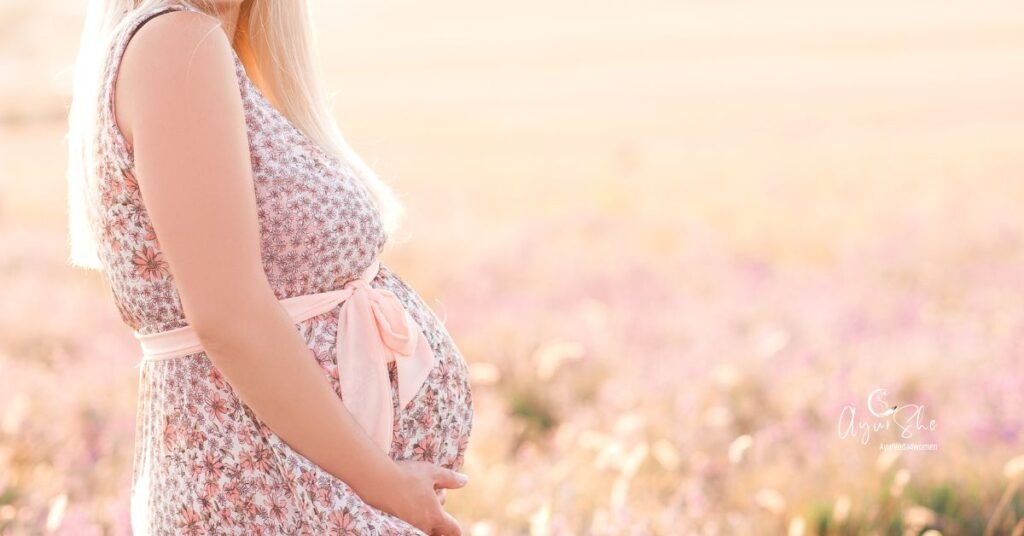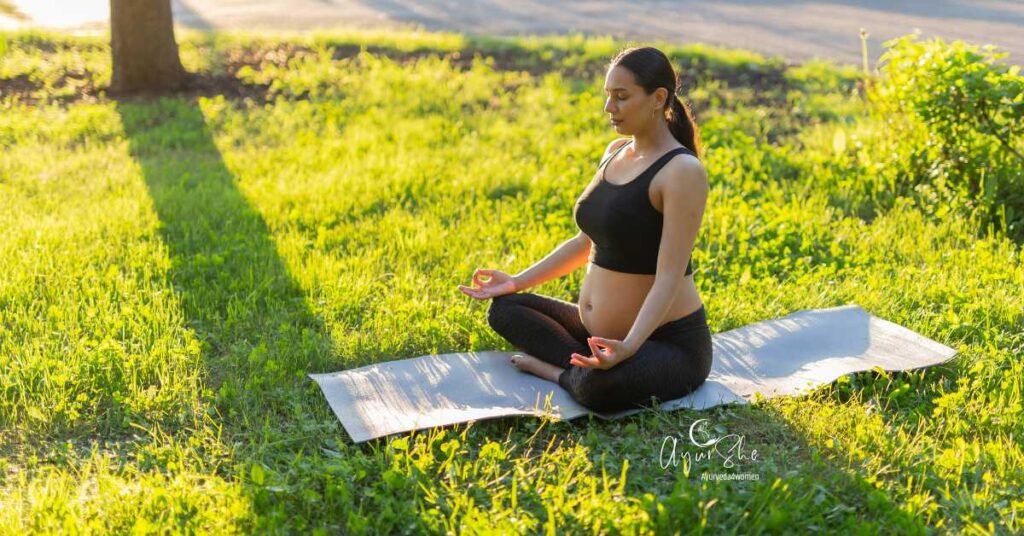Menopause marks a significant physiological and emotional transition in a woman’s life, typically occurring between the ages of 45–55. While it is a natural cessation of the menstrual cycle, the post-menopausal phase can bring with it a host of challenges, with insomnia or disturbed sleep being one of the most common and disruptive.
Modern science attributes post-menopausal sleep disturbances to hormonal shifts, hot flashes, mood disorders, and circadian rhythm disruption. Ayurveda, however, provides a deeper, holistic perspective, viewing these symptoms as a result of doshic imbalances, particularly Vata and Pitta, and the depletion of Ojas, the essence of vitality and resilience.
This article presents an Ayurvedic review of post-menopausal insomnia, its root causes, and evidence-based holistic strategies for restoring restful sleep.
I. Understanding Post-Menopausal Insomnia – Modern Perspective
🔄 What Happens After Menopause?
- Estrogen and progesterone levels decline, which affects:
- Sleep regulation (both hormones interact with serotonin and melatonin)
- Thermoregulation (leading to hot flashes and night sweats)
- Mood (anxiety, depression can interfere with sleep)
😴 Common Sleep Issues Post-Menopause
- Difficulty falling asleep
- Frequent nighttime awakenings
- Early morning waking
- Non-restorative sleep
- Accompanying issues: hot flashes, anxiety, muscle stiffness
II. Ayurvedic Understanding of Sleep (Nidra) and Menopause
🌙 Nidra – One of the Three Pillars of Life
According to Ayurveda, Nidra (sleep) is one of the Traya Upastambha (three pillars of health), along with Ahara (food) and Brahmacharya (regulated lifestyle).
Sleep supports:
- Tissue regeneration
- Mental clarity
- Hormonal balance
- Emotional stability
🔥 Menopause = Jara Avastha (Age-related transition)
Ayurveda classifies menopause under Jara Avastha (aging), a natural stage dominated by Vata dosha. After menopause:
- Vata increases (dryness, restlessness, insomnia)
- Pitta aggravation (hot flashes, irritability, night sweats)
- Ojas (vitality) depletes due to hormonal decline and cumulative stress
III. Ayurvedic Causes of Sleeplessness After Menopause
| Ayurvedic Factor | Manifestation |
|---|---|
| Vata Vriddhi (increase in air/space elements) | Racing thoughts, light sleep, frequent waking |
| Pitta Vriddhi (heat/fire) | Hot flashes, night sweats, irritability |
| Ojakshaya (low vitality) | Fatigue with poor recovery, low emotional resilience |
| Manovaha Srotas Dushti (mind-channel imbalance) | Anxiety, mood swings, low sleep quality |
IV. Ayurvedic Treatment Approach
Focus: Pacify Vata & Pitta, rejuvenate Ojas, support mind-body harmony
🌿 1. Ayurvedic Herbs for Sleep Restoration
(With Dosage & How to Use)
| Herb | Action | Form | Dosage | Usage |
|---|---|---|---|---|
| Ashwagandha | Adaptogen, calms Vata, reduces cortisol | Powder / Capsule | 1 tsp powder or 500 mg capsule | With warm milk at night |
| Tagara (Valeriana wallichii) | Sedative, improves deep sleep | Powder / Tablet | 250–500 mg tablet | 30 mins before sleep |
| Jatamansi | Nervine tonic, reduces mental restlessness | Powder / Capsule | 1/4–1/2 tsp or 250 mg | With honey or warm water |
| Brahmi | Mental clarity, emotional calm | Brahmi ghee or capsule | 1 tsp ghee or 250 mg capsule | Morning and night |
| Shankhpushpi | Calms nervous system | Syrup / Powder | 5–10 ml syrup | After dinner |
Note: Consult an Ayurvedic doctor before combining with prescription meds.
🧘 2. Lifestyle & Behavioral Recommendations (Vata-Pacifying Dinacharya)
| Time of Day | Recommendation |
|---|---|
| Morning | Wake up at the same time daily, avoid caffeine, light oil massage (Abhyanga) with sesame oil |
| Evening | Avoid screens after 8 PM, eat light warm dinner, practice gratitude journaling |
| Night | Warm bath with vetiver or sandalwood oil, drink warm turmeric or nutmeg milk |
🫖 3. Sleep-Promoting Herbal Recipes
🥛 Nutmeg Milk (for deep sleep)
- 1 cup warm A2 cow’s milk
- 1/4 tsp nutmeg powder
- 1/2 tsp ghee
Drink 30 mins before bedtime.
🌿 Sleep Tea
- 1 tsp chamomile
- 1/2 tsp fennel
- 2–3 crushed tulsi leaves
- Steep for 7–10 minutes
Drink post-dinner or before bed.
🛀 4. External Therapies
🔸 Abhyanga (Oil Massage)
- Use Bala Ashwagandha oil or Ksheerabala oil
- Massage feet, scalp, and temples before bed
🔸 Shirodhara
- Continuous flow of warm oil on the forehead
- Excellent for long-term insomnia, anxiety, and hormonal imbalance
- Recommended in chronic cases under professional care
🔸 Nasya (Nasal Drops)
- 2 drops of Anu tailam or Brahmi ghee in each nostril after steaming face
- Calms nervous system and supports melatonin
🔄 5. Detox & Rejuvenation (When Needed)
If insomnia is severe and chronic, consider Panchakarma, especially:
- Virechana (for Pitta-related symptoms like hot flashes)
- Basti (oil enema to nourish Vata and reproductive system)
Rasayana therapy (rejuvenation) can rebuild Ojas using:
- Ashwagandha, Shatavari, Chyawanprash, Brahma Rasayana
🧿 Mind-Body Practices for Menopausal Sleep
| Practice | Benefit |
|---|---|
| Yoga Nidra | Guided relaxation to induce deep rest |
| Pranayama | Nadi Shodhana & Bhramari calm the mind |
| Meditation | Reduces cortisol, stabilizes emotional waves |
| Foot massage | Activates Marma points, improves grounding |
🔔 When to Seek Help
- Severe insomnia lasting >3 weeks
- Accompanied by depression, panic attacks, or high blood pressure
- Interferes with work, mood, or health
- On HRT or medications—herb-drug interactions need monitoring
✅ Summary: Ayurvedic Goals for Post-Menopausal Sleep
- Balance Vata – through oiling, warmth, and grounding food
- Pacify Pitta – cooling herbs, night routines, emotional calm
- Rejuvenate Ojas – restore strength, sleep, and resilience
- Support the Mind – reduce digital stimulation, overthinking
- Align with Nature – regular routines, early to bed, early to rise
🕯️ Conclusion
Sleeplessness after menopause is not just a symptom—it is your body’s call for deeper care and inner nourishment. Ayurveda offers a time-tested path to bring back restful nights through natural rhythms, herbs, rituals, and a sattvic lifestyle.
With commitment and consistency, working with your body’s prakriti (constitution) rather than against it, you can reclaim the calm, restorative sleep you deserve.




